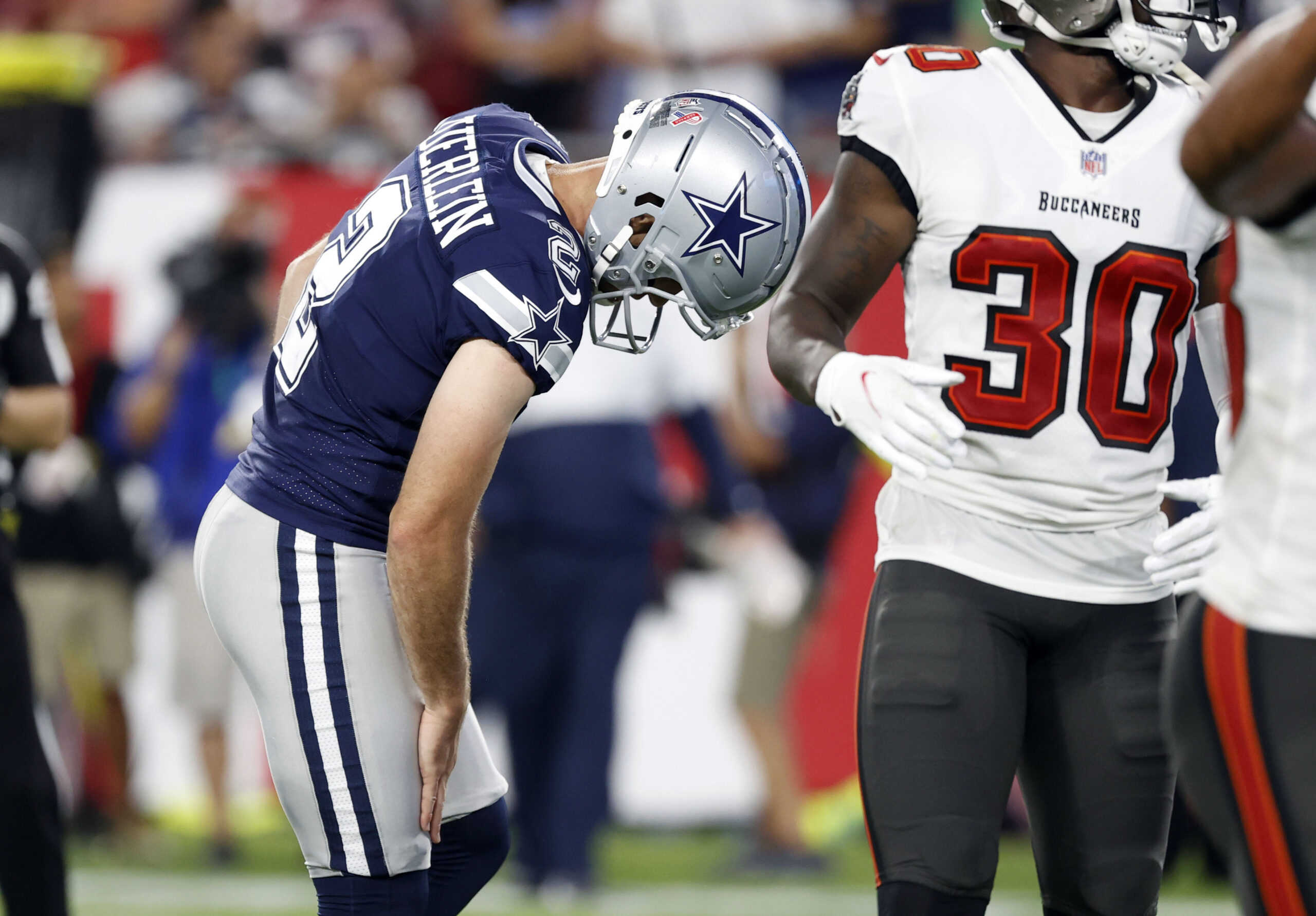To an objective NFL fan without a horse in the race, the Dallas Cowboys and the reigning Super Bowl champion Tampa Bay Buccaneers played a wonderfully exciting football game to kick off the 2021 NFL season Thursday night. There were a combined five turnovers, nearly 800 passing yards, and 60 total points scored.
But to Dallas, the real story of the game lies in another number: 7.
The tale of the Cowboys in Week 1 comes down to the seven points they failed to score after three missed Greg Zuerlein kicks. A full touchdown’s worth of points that never happened, in a game in which Dallas only lost by two. That’s a hard pill to swallow.
Zuerlein’s difficult start to the year was confined to a tough sequence of events in the final seven — there it is again! — minutes of the second quarter, when on four straight attempts he went:
- Missed 31-yard field goal
- Missed extra point
- Made 35-yard field goal
- Missed 60-yard field goal
Obviously, it’s hard to really fault him for missing the 60-yard attempt toward the end of the first half, but those first two really sting.
In the NFL, 31 yards should be near automatic. In fact, based on historical field goal data, the NFL’s Next Gen Stats gave that 31-yard attempt a 92.7 percent probability of success.
Dallas was fortunate enough to get the ball back on the very next play when DeMarcus Lawrence did DeMarcus Lawrence things and forced a fumble by Bucs running back Ronald Jones. Then, following a quick five-play touchdown drive that should have turned the tide in the Cowboys’ favor, Zuerlein doinked the extra-point attempt off the left upright to leave Tampa Bay with a one-point lead.
Dallas caught another break after the 60-yard miss, when Tom Brady failed to move his team into field-goal range in the final 20 seconds, leaving it a one-score game heading into halftime. Zuerlein had a chance to reset during the break and prepare for a second half, where he would play a crucial role.
Here’s the thing about kicking field goals in the NFL: it’s hard. Greg Zuerlein can’t take all the blame for a two-point loss, especially when he did come through in the clutch and nail a 48-yard attempt in the final minutes to give Dallas the lead. Swapping out those first-half misses for makes seems like it would be enough to get the Cowboys to 1-0 instead of 0-1, but it’s not that simple. Different outcomes early in the game change how the game is played later on. The blame for this loss can’t be entirely on Zuerlein.
Let’s go back to that 48-yard field goal that gave the Cowboys the lead in the final minutes of the game. Dallas had a 4th-and-6 at the Tampa Bay 30-yard line. Tampa Bay still had one timeout left. Making the 48-yard field goal right there — which Zuerlein established earlier was far from a sure thing — would mean giving Tom Brady the ball back with 84 seconds of game clock and only needing a field goal to win the game. Anyone who has followed the NFL over the last 20 years knows that means a Bucs win is imminent. And yet it doesn’t seem as though head coach Mike McCarthy gave the decision to kick the field goal a second thought.
Rewind a couple of plays before the successful-yet-damning field goal attempt, and it becomes clear that the Cowboys were never really going to attempt a fourth-down conversion instead of kicking that field goal.
Here’s the play I’m talking about:
this is when you knew they were playing to give the ball back to the bucs with time left on the clock pic.twitter.com/tnPBuRiEuQ
— Dan (@danmorse_) September 10, 2021
In the statistics community, running the ball on 2nd-and-10 is widely viewed as one of the least effective plays in football. One doesn’t have to dig too deep into the numbers to see why, either.
Take this specific case as an example: McCarthy chose to give the ball to Ezekiel Elliott, who up to that point had carried the ball 10 times for 2.9 yards per carry. He’s intentionally putting his team in a 3rd-and-long situation because he’s focused less on actually earning a new set of downs and more on draining game clock while already in field-goal range.
All this is to say, when the time came to send out the field-goal unit on 4th-and-6, McCarthy likely didn’t give much thought to the idea that he should instead lean on his team’s strength and send Dak Prescott back into the huddle to win the football game. Which is a shame because that’s exactly what he should have done.
Making aggressive decisions on fourth down is a relatively new wave of thinking in the NFL. The poster child for it is John Harbaugh’s Baltimore Ravens. Harbaugh has a 25-year-old Yale graduate in his ear on game days telling him when it is mathematically optimal to go for that fourth-down conversion rather than settle for the more conservative field goal. The math surrounding these decisions typically comes down to win probability — the likelihood that your team will win at any given point in a game.
One of the more common win probability models in the public sphere comes from The Athletic’s Ben Baldwin. By calculating the team’s win probability before a fourth down along with what their win probability would be if they were to either kick a field goal or convert the fourth down, Baldwin can put a literal number grade on a team’s decision-making.
There’s a lot going on in this graphic, but focus for now on the farthest-right column. Assuming the Cowboys make the go-ahead field goal, they are still more likely than not to lose the game, with just a 46 percent win probability. What’s more, this doesn’t even take into account that Dallas was up against one of the best offenses in the NFL, while Dallas sported — let’s call it not one of the best defenses in the NFL. If they instead went for the conversion and succeeded, they suddenly become favored to win the game with a 57 percent win probability.
McCarthy’s decision-making process at the end of the game was centered more on trying not to lose rather than trying to win, and it came back to bite him. Perhaps even more confounding is that, during his tenure in Green Bay, McCarthy was consistently one of the most aggressive coaches on fourth downs in the entire NFL. That has not yet transferred over to Dallas. With seven points left on the board from missed kicks and several more in limbo after not carrying an aggressive mindset to high-leverage situations, the Cowboys now sit at 0-1 for the second consecutive year. If missing a touchdown’s worth of kicks isn’t enough to motivate McCarthy to be more aggressive, it’s hard to see that changing any time soon.






